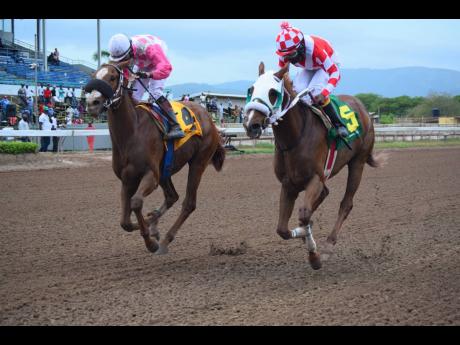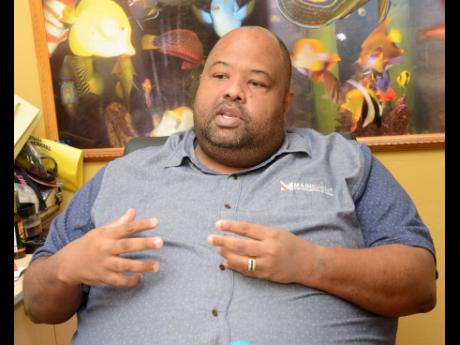Jimmie says | Let’s not waste a good crisis
In every crisis, there is opportunity, which local racing should not allow to pass without capitalising. To say horse racing has been Jamaica’s most fortunate sport, long before the arrival of COVID-19, would be an understatement.
From a publicity perspective, there has never been any local sport to have ever, and will never, enjoy the coverage that local racing commands, free of charge, in print and electronic media. Whereas other sports scrounge for media sponsorship, horse racing has never been short of suitors providing countless column space and hours of airtime, before and after the bugle is blown at Caymanas Park, even with the advent of private ownership through divestment to Supreme Ventures Racing and Entertainment Limited (SVREL).
While other sports perennially beg for government assistance, there is a possibility that a figure will never be ascertained to account for the billions of dollars pumped into Caymanas Park by respective administrations, from either side of the political divide, now joined by a private-sector entity, which is still trying to figure out how the hell it got into a situation which then Finance Minister Audley Shaw lauded SVREL’s former boss, Paul Hoo, for being “the bravest man in the room”.
COVID-19 happened, and every sport caved in, horse racing included, until, out of desperation, forces that always pulled in opposite directions met at the crossroads of survival to lead the way regionally for a resumption of the sport and livelihood of thousands.
EASILY SATISFIED
However, appearing too easily satisfied, local racing’s players have apparently not taken stock of their close brush with an extended shutdown from which other sports such as football have just started talks of resumption.
This period of early curfew hours, lockdown days, and limited patronage ought to have opened the eyes of local-racing players to the reality of the state of the industry, starting dialogue for a renewed emergence from the COVID-19 era, hitting the ground running before the next Budget is prepared, with the Government exploring all available options to stimulate the economy.
Similar to the early days of COVID-19, horse-racing interests should be huddling every chance they get, putting aside selfish differences, egos, and plain stupidity to establish a master plan for January 2022. Instead, they’re all back at Caymanas Park, waiting in line to win a condition race or to be among the hordes drawing straws to claim Unbreakable, who has changed barns for each of his last dozen starts, possibly winning two races in the interim.
Apart from not being for the faint of heart, owning a racehorse singularly is similarly not a venture for persons of modest income, a group that includes trainers who are licensed as owners by the Jamaica Racing Commission without having to show the means of affordability.
It is from among this group that opposition is rife to reverting to a ratings-based handicapping system that does not force persons, who believe in perennially reinvesting in new horseflesh, to sell their horses in claiming events to win purse money after suffering through condition races for a year or more.
IGNORANT OWNERS
Not being able to see farther than hustling ignorant owners stifles the ability and reputations of too many trainers, who fail to realise the opportunities that exist in a rating system that quickly sends superior horses to race against each other instead of plundering purses against inferior opposition, a process known as ‘winning out their conditions’, making those with weaker horses appear less talented than their more fortunate peers, whose owners provide them with the crème de la crème, acquired from the farm gate or yearling sale.
However, smaller trainers’ fears of not being able to acquire horses, outside of claiming, are real and must be remedied ahead of reverting to a ratings-based handicapping system, which would only serve to make them further marginalised than they already are without a levelling of the playing field.
Hence, a national stud is a must, not only for ensuring a ‘true’ yearling-sale auction, void of reserved prices and private owner-breeders driving up prices on bidders, but also a horse-racing industry academy, similar to the British and Irish national studs, which, in addition to offering every service imaginable, also cater to professional qualification, starting from groom to veterinarian, a complete package to the benefit of what local racing can become, a gem in the biggest community in the Caribbean with immense human resources.
Therefore, Chairman Solomon Sharpe, during this crisis, your grand ambitions of a new tote board, grass track, trainers’ pavilion, and the likes, are all commendable. However, why put any of these ahead of being the lead voice for the establishment of a national stud, serviced by a cohort of imported mares and stallions, which would allay the fears of trainers not being able to acquire horses outside of claiming nine and 10-year-olds?
This might not appear to be the remit of the promoting company. However, there are times when hands need to be held and led for the benefit of all concerned.
Ainsley ‘Jimmie’ Walters has been covering horse racing for more than 25 years for the Gleaner Company (Media) Limited and is the editorial and production coordinator for the Track And Pools race form.


